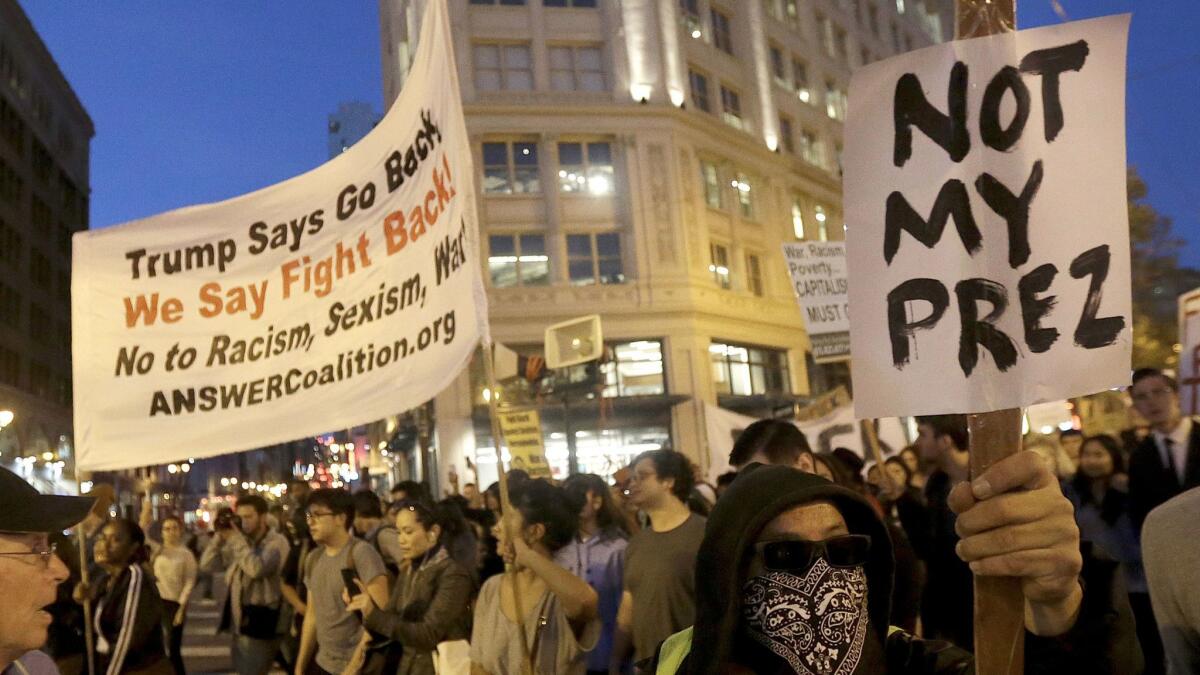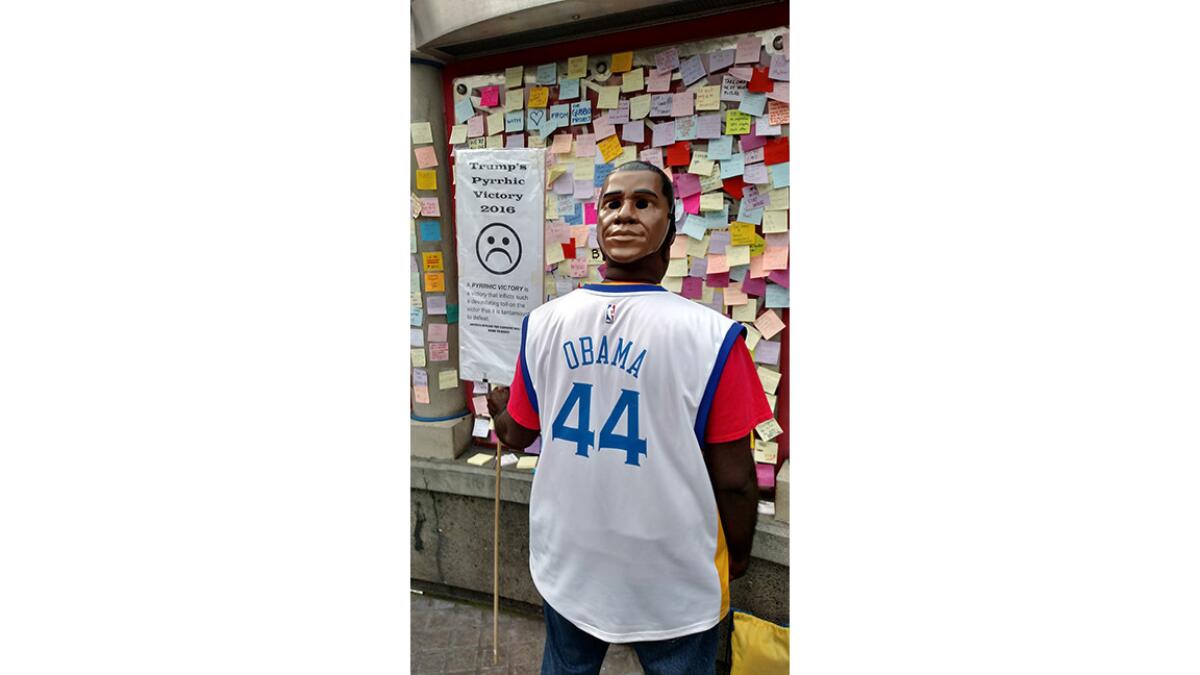Blue times for a blue city by the Bay
Reporting from San Francisco — It was the second Tuesday of November, one week after the election of Donald J. Trump, and hundreds of protesters were on the march, streaming down Market Street toward City Hall under police escort.
There was something about this march that distinguished it from the almost daily post-election demonstrations that have occurred across the San Francisco Bay Area, mostly peaceful, a few marked by vandalism: President-elect Trump was not the target.
Rather, the protest was aimed at the proposed Dakota Access Pipeline, a 1,172-mile crude oil line that critics fear could harm lands held sacred by Native Americans.
We want to use music to put forward the ideals of compassion, activism and community.
— Chris Verdugo, executive director of the San Francisco Gay Men’s Chorus

In one sense, the non-Trump demonstration seemed to suggest a return to normal for a city with a long tradition of taking progressive political views to the streets.
At the same time, however, it underscored an increasingly common response here as the city’s initial shock and anger over the election begins to subside — a greater need to take up a cause, to pay more attention, to engage more actively in civic life.
“There are a lot of different issues,” said Patricia St. Onge, one of the protest organizers, who noted that representatives from Black Lives Matter and other movements had turned out as well. “What we want to do now is start connecting all the dots.”
If California, as described by Teddy Roosevelt, is west of the West, then San Francisco stands to the far left of the Left Coast. The election results provided vivid evidence.
Fewer than 1 in 10 San Franciscans voted for Trump; 85.4% cast ballots for Clinton. Across the seven-county Bay Area, the voting was almost equally lopsided, with Clinton receiving nearly 1.3 million votes more than the president-elect. Take away that margin, and Trump would have prevailed nationally in the popular vote.
We’ll survive.
— Boyton Jones, tech worker
With the wide margins came an even wider river of grief here once it became clear Trump had prevailed. In the election aftermath, the emotional stages identified by Elizabeth Kubler-Ross in her landmark treatise “On Death and Dying” all have been on display here: denial, anger, bargaining, depression, plenty of each of these.
“Stop the transition,” demanded a letter published Friday in the Chronicle from a reader who appeared to have moved on from denial to bargaining. “… The election is invalid, and I demand a new one, with United Nations accountability.”
Less in evidence has been acceptance, the fifth emotion Kubler-Ross discerned in her study of the terminally ill, but there are moments.

“We’ll survive,” said Boyton Jones, a 51-year-old unemployed tech worker. “You have to knuckle down, but we’ll get through it just fine.”
Jones was outside the 16th Street BART subway station, applying adhesive tape to keep multicolored sticky notes from blowing away in the breeze. People had been placing hand-written messages on a station wall since the election.
“Discrimination is sin,” one proclaimed.
“Pray,” counseled another.
“Don’t lose hope,” offered another, followed by a smiley face.
“Somebody ought to write (expletive) fascism,” growled a bearded young bicyclist as he shot past.
Laid off in January and saddled with high rent, Jones, an Air Force veteran, said he was leaning toward Trump early in the campaign, “but then it became racist.” On election night, he joined a large protest in downtown Oakland, but was dismayed, he said, when “anarchists” started smashing windows.
He decided to go his own way. He built a sign warning of Pyrrhic victory and chickens coming home to roost, donned a Golden State Warriors jersey with “Obama 44” across the back, along with an Obama mask, and started walking across the Golden Gate Bridge.
“I do my thing on the bridge,” he said. “My own protest.”
He had come to the BART station wall to see the notes and noticed that they were beginning to blow away. So he took it upon himself to make sure each was shored up with tape.
“When you are so angry, and you feel like doing something negative,” he said, “the best cure is to do something positive.”
Muriel MacDonald, a 25-year-old writer for a political consulting firm, started the wall project. She described riding a street car to work after the election; the car was filled with passengers. They all kept their heads down and did not speak.
“It was silent,” she recalled, “the whole way.”
She said her project was her attempt to move forward. She said it’s been criticized for being “too warm and fuzzy. But I am just trying to help people process so we can move on and fight. It’s not about warm and fuzzy. It’s about psychological healing.”
Since the election San Franciscans have expressed, in private conversation and in published letters, a desire to look inwardly, circle the wagons, go it alone. There has even been columnist chatter about supporting a California secession from the union —no doubt impossible, but the conversational equivalent of comfort food.
Others have advocated for pushing out into the country, assuming a national leadership role for blue state Americans, exporting Californians to register for the next election in critical red state districts.
For example, the San Francisco Gay Men’s Chorus, born in the aftermath of Supervisor Harvey Milk’s assassination 40 years ago, announced this week a plan to perform a “freedom tour” through some of the reddest of red states in 2018.
“This chorus is rooted in social activism,” explained Executive Director Chris Verdugo. “We want to use music to put forward the ideals of compassion, activism and community. These are our templates.”
For his part, Mayor Ed Lee has offered at once both the idea of turning inward and of leading outward.
“Today,” he noted in a statement, “many San Franciscans are feeling anxious and nervous following this divisive and polarizing presidential election.
“But San Francisco will remain San Francisco…. San Francisco will continue to be a beacon of light, a city dedicated to progress, and a leader on issues that have changed the landscape of our country for the better.”
In this bluest of blue cities, anyway, the mayor’s sentiments did not necessarily seem like denial.
Twitter: @peterhking
More to Read
Sign up for Essential California
The most important California stories and recommendations in your inbox every morning.
You may occasionally receive promotional content from the Los Angeles Times.











